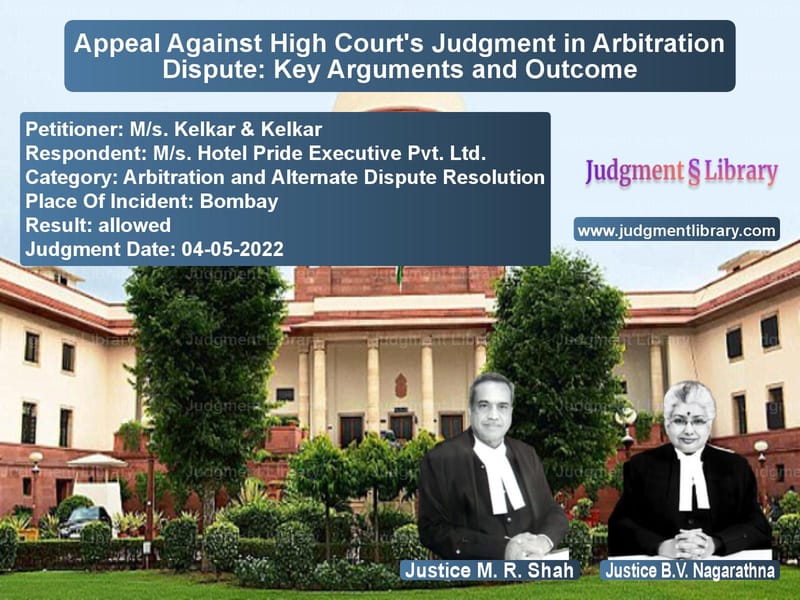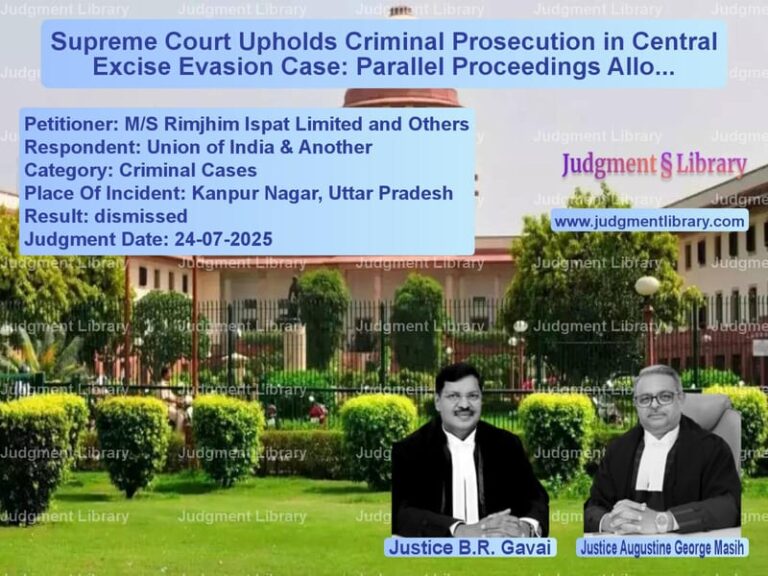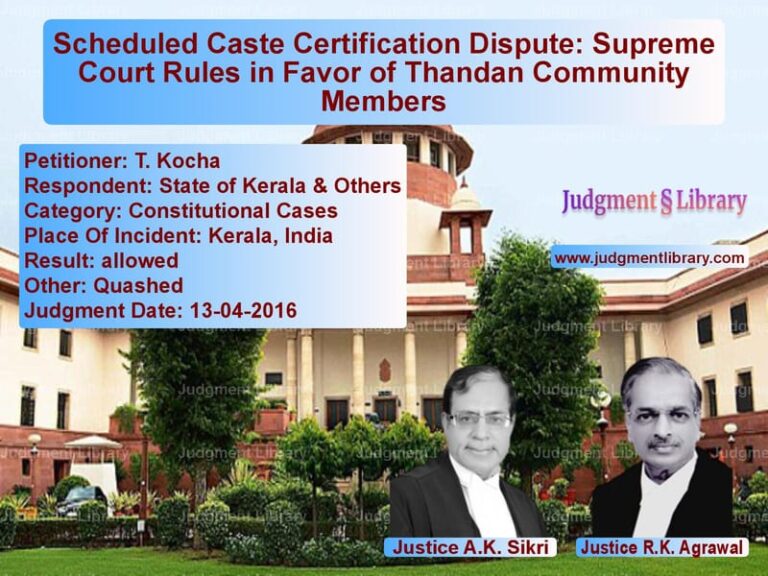Appeal Against High Court’s Judgment in Arbitration Dispute: Key Arguments and Outcome
In this case, the appellant, M/s. Kelkar & Kelkar, challenged the judgment and order passed by the High Court of Bombay. The dispute between the appellant and the respondent, M/s. Hotel Pride Executive Pvt. Ltd., had initially been the subject of arbitration. After the arbitration award, the original claimant sought to make it a decree in the civil suit, and the issue was brought before the Supreme Court.
The background of the case is that the original claimant had filed a suit following an arbitration award where the respondent was directed to pay Rs. 12,46,663. Despite the order, the respondent approached the High Court on the grounds of non-compliance with Clause 56 of the Articles of Agreement before the Arbitrator’s appointment. The High Court allowed the writ petition and set aside the Arbitrator’s award, remanding the matter for de novo consideration. This prompted the appellant to approach the Supreme Court, challenging the High Court’s decision.
In hearing the case, the Supreme Court considered several important aspects of law, particularly regarding the scope of judicial intervention in arbitration awards and the alternative statutory remedies available under the Arbitration Act, 1940. The Court emphasized that judicial review under Articles 226 and 227 should not be used when alternative remedies exist, specifically when an appeal is provided under the Act.
Petitioner’s Arguments
The petitioner argued that the High Court had erred in setting aside the arbitration award. The petitioner claimed that the dispute was rightly resolved by the Arbitrator, and the award should have been upheld by the court. Moreover, the appellant contended that the High Court’s intervention under Articles 226 and 227 was unjustified because the Arbitration Act itself provided an appeal mechanism.
Respondent’s Arguments
On the other hand, the respondent contended that there had been procedural non-compliance regarding Clause 56 of the Articles of Agreement before the Arbitrator was appointed. This, they argued, invalidated the arbitration process, and therefore the award should not be enforced. The respondent prayed for a remand of the matter, asserting that the High Court’s decision to quash the award was justified due to these procedural irregularities.
Judicial Analysis and Court’s Conclusion
The Supreme Court analyzed the arguments presented and expressed concern about the High Court’s interference with the arbitration award, especially when a statutory remedy in the form of an appeal was available under the Arbitration Act. The Court emphasized that it is well-settled that when the statute provides an alternative remedy, especially through an appeal, the High Court should refrain from exercising its writ jurisdiction unless there are extraordinary circumstances.
Considering the legal framework and the facts presented, the Supreme Court concluded that the High Court had acted beyond its jurisdiction by intervening in the arbitration process. The Court ruled that the appeal against the High Court’s order should be allowed, thereby setting aside the judgment and remanding the matter back to the legal process with the condition that the respondent could take recourse under the Arbitration Act, 1940.
The Court also made an observation regarding the payments already made by the appellant, noting that the amounts paid to the original claimant should be adjusted according to the future legal proceedings and their ultimate outcome.
In conclusion, the appeal was allowed with the result that the High Court’s judgment was set aside. However, the respondent retained the right to pursue remedies available under the Arbitration Act, and the Court emphasized that any proceedings initiated within four weeks should be considered without raising objections about limitations.
Final Decision
The final ruling was to allow the appeal, set aside the High Court’s judgment, and allow the respondent to take further legal action within the defined period. However, the Court clarified that no costs would be awarded in this case.
Petitioner Name: M/s. Kelkar & Kelkar.Respondent Name: M/s. Hotel Pride Executive Pvt. Ltd..Judgment By: Justice M. R. Shah, Justice B.V. Nagarathna.Place Of Incident: Bombay.Judgment Date: 04-05-2022.
Don’t miss out on the full details! Download the complete judgment in PDF format below and gain valuable insights instantly!
Download Judgment: ms.-kelkar-&-kelkar-vs-ms.-hotel-pride-exe-supreme-court-of-india-judgment-dated-04-05-2022.pdf
Directly Download Judgment: Directly download this Judgment
See all petitions in Arbitration Awards
See all petitions in Dispute Resolution Mechanisms
See all petitions in Arbitration Act
See all petitions in Judgment by Mukeshkumar Rasikbhai Shah
See all petitions in Judgment by B.V. Nagarathna
See all petitions in allowed
See all petitions in supreme court of India judgments May 2022
See all petitions in 2022 judgments
See all posts in Arbitration and Alternate Dispute Resolution Category
See all allowed petitions in Arbitration and Alternate Dispute Resolution Category
See all Dismissed petitions in Arbitration and Alternate Dispute Resolution Category
See all partially allowed petitions in Arbitration and Alternate Dispute Resolution Category







